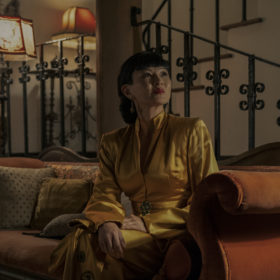How Hollywood’s Costume Designers Brought the Golden Age of Cinema to Life
There was no buzzier place in the late 1940s than Hollywood — it seems like everyone had dreams of being a star, lured in by the icons of the day and their captivating lives both on and off-screen. In Ryan Murphy’s new show, Hollywood, which starts streaming on Netflix tonight, a plucky cast of characters stand down adversity of all kinds to stake their claim in tinsel town, all while looking utterly fabulous doing it.
That’s thanks to the work of costume designers Sarah Evelyn and Lou Eyrich, who spent weeks researching and conceiving of looks ranging from the every day to special occasions and major events. “I hadn’t done forties before,” Evelyn tells FASHION, adding that the task was not only to replicate the key styles of the time, but also “to wrap our heads around Ryan’s vision of the forties.” This undertaking involved a collaboration with fashion historian Raissa Bretaña, who assisted Evelyn and Eyrich in deciding how to approach the show’s outfits with authenticity, panache and correctness in interpreting any etiquette considerations of the time. “[She] helped comb through Women’s Wear Daily and Emily Post,” says Evelyn of the process, which was an arduous one to say the least. “A lot of this information wasn’t even in pictures, it was written at the time.”

While it’s easy to take for granted the sartorial liberties we presently enjoy, in the forties there was much going on above and beyond simple aesthetics in terms of how people dressed. “The etiquette is super important,” Evelyn notes. “The questions of would they be wearing a hat then, and why, and where, and what hairstyle would say, ‘This is a hat I could take off or leave on?’ That took a lot of research as well.”
There’s also the many nuances of an outfit that the duo had to approach, something difficult to do when finding vintage examples of simple, every day earrings and other accessories was difficult. “It wasn’t so hard to find the dressier stuff,” Eyrich says of the dazzling jewellery you’ll see in some episodes. “[And] we made a lot of belts,” she adds. To further complicate their job, Eyrich says that dressing someone with today’s gym buff physique posed a challenge. “In the last couple of decades, people [became] obsessed with working out. That wasn’t a thing in the forties,” Eyrich says.
Luckily the costume department could create looks based on research the team had done, but Evelyn notes that finding the right fabrics that would truly give a sense of that perfect 1940s drape was also an occasional dilemma. “Fabric has changed,” she says, with Eyrich adding that it took about two weeks to decide on the perfect material to simply make a set of gas station attendant uniforms.

Complications aside, Hollywood’s cast are decked out in ensembles that fashion fantasies are made of—in particular Patti LuPone’s gutsy character, Avis Amberg. It’s important to highlight that throughout the show, Amberg is shown wearing low-cut silhouettes that bare her décolletage—not something typically seen on actresses over 50. “I love the way these older female characters were portrayed,” says Evelyn. “When she put on the costumes, she came alive,” Eyrich adds about LuPone’s first fitting for the show. “She was dancing around the fitting room.”
Evelyn and Eyrich were pleased with LuPone’s “more is more” attitude when it came to the wardrobing, especially considering how rich the time period was when it came to accessorizing. “We’d say, ‘Put a glove on it!’ if we felt something was missing,” says Eyrich.

Perhaps the show will be a bit of inspiration for those of us hoping to partake in the fashion world’s current obsession with hats and gloves—a testament to the notion that style moves in cycles. “Maybe it’s a reaction to streetwear and athleisure,” muses Evelyn when asked why she thinks these decadent add-ons are back in vogue.
Whatever the reason, you’ll undoubtedly find yourself pining for a prim skirt suit, flashy spectator shoes and natty waistcoats after watching just a few episodes of the show. And if it isn’t enough wardrobe inspiration to get your fill, take a cue from Eyrich’s current quarantine activity. “I’m going through all my magazines and doing tear sheets,” she says. “I’ve started a wall collage of things that make me happy in fashion.” And who knows, maybe you’ll look back at these images decades later to see how much things have—and haven’t—changed.
The post How <em>Hollywood’</em>s Costume Designers Brought the Golden Age of Cinema to Life appeared first on FASHION Magazine.